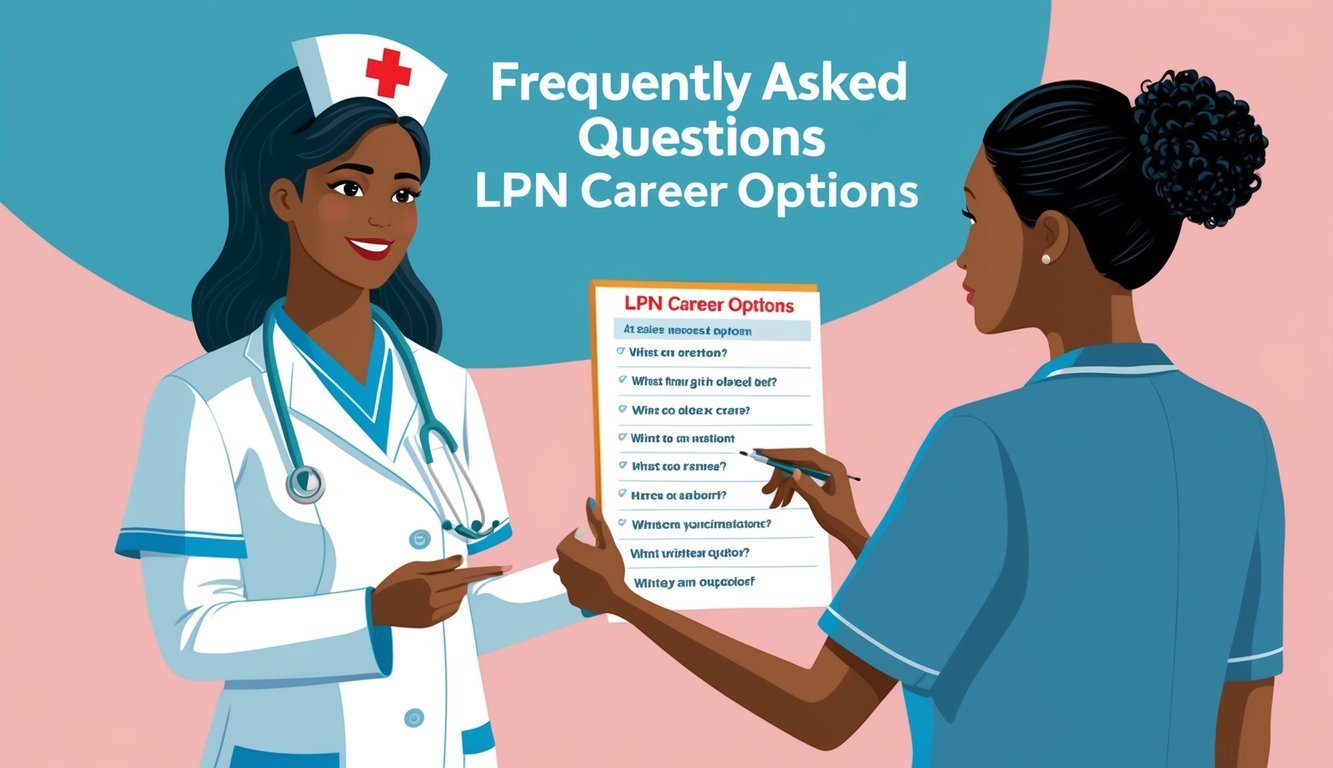Licensed Practical Nurses (LPNs) play a vital role in the healthcare system, providing essential care to patients in various settings. LPNs have various career paths that can lead to rewarding opportunities and professional growth. Whether you want to remain at the bedside or explore managerial roles, the options are diverse and flexible.
As you consider your future in nursing, it’s important to understand the different pathways that can shape your career.
Many LPNs choose to advance their education and become Registered Nurses (RNs) or specialize in specific areas such as pediatrics or geriatrics.
Others may find satisfaction in non-traditional roles, including telehealth or administration, allowing for a different kind of patient interaction.
Exploring these various paths can help you identify what aligns best with your skills and interests.
With growing demand in the healthcare field, now is a great time to explore your options and take the next step in your career journey.
Key Takeaways
- LPNs have diverse career options that expand beyond traditional nursing.
- Advancing to an RN can open more career opportunities in healthcare.
- Specializations and alternative roles enhance job satisfaction and skills.
Exploring the LPN Profession
As a Licensed Practical Nurse (LPN), you play a vital role in patient care.
Understanding your responsibilities, the education required, and how to earn certification through the NCLEX-PN exam is essential for success in this field.
Roles and Responsibilities
As an LPN, you provide nursing care under the supervision of registered nurses and doctors.
Your typical duties include:
- Assisting Patients: You help with daily activities such as eating, bathing, and mobility.
- Monitoring Health: You check vital signs like blood pressure, pulse, and temperature.
- Administering Medication: This involves giving prescribed medications and keeping track of patient responses.
- Documentation: You also maintain accurate health records and update medical charts.
Effective communication is crucial since you often serve as a bridge between patients and healthcare teams.
Building rapport with patients also enhances their comfort and compliance with treatment plans.
LPN Programs and Certification
To become an LPN, you must complete an accredited LPN program, which typically lasts about one year.
These programs cover essential topics such as:
- Basic Nursing Skills
- Pharmacology
- Human Anatomy and Physiology
- Healthcare Ethics
After finishing your program, you need to pass the NCLEX-PN exam to earn your license.
This exam assesses your knowledge and competency in various nursing areas.
Many programs offer hands-on clinical experience, which helps you gain practical skills.
Ensure to choose a program that meets state licensing requirements and offers solid job placement support.
The NCLEX-PN Exam
The NCLEX-PN exam is a crucial step in your journey to becoming a licensed practical nurse.
This exam tests your understanding and application of nursing principles.
Key areas covered include:
- Safe and Effective Care Environment
- Health Promotion and Maintenance
- Psychosocial Integrity
- Physiological Integrity
Preparing for the exam involves reviewing course materials, practicing with sample questions, and taking review courses if necessary.
Passing the NCLEX-PN is your pathway to practicing as an LPN and advancing your career in healthcare.
Consider checking out resources from NCSBN for more information on the exam.
Career Pathways for LPNs
Licensed Practical Nurses (LPNs) have various career pathways that allow them to work in different healthcare environments.
Each setting offers unique opportunities and challenges that can affect your professional growth and job satisfaction.
Hospitals and Primary Care Settings
In hospitals, LPNs play a vital role in patient care.
You will assist in monitoring vital signs, administering medications, and helping with daily living activities.
Your duties may include charting patient information and collaborating with RNs and doctors to enhance patient outcomes.
Primary care settings also provide valuable opportunities.
Here, you might work in outpatient clinics or family practices.
Responsibilities include patient education, assisting with examinations, and supporting chronic disease management.
Hospitals and primary care environments often offer a fast-paced atmosphere with varied experiences that can be both rewarding and educational.
Long-Term Care and Residential Facilities
Long-term care facilities, including nursing homes and assisted living homes, are essential for elderly and disabled individuals.
In these roles, you will provide ongoing care, support daily activities, and foster social interactions among residents.
Your focus will often be on maintaining quality of life and promoting independence.
Residential facilities allow you to build strong relationships with residents as you provide routine care.
You may help with medication management, personal hygiene, and coordinating with families.
This setting provides a chance to specialize in areas like gerontology, which focuses on the elderly population and their unique healthcare needs.
Specialized Areas of Nursing
Specialized nursing areas offer LPNs the chance to focus on specific health issues.
You might explore roles in mental health nursing, where you care for individuals dealing with psychological issues.
In this role, your duties include monitoring patient mental health, assisting with treatment plans, and providing emotional support.
Other specialized options include working in home health, where you provide care for patients in their residences.
This setting allows you to develop personalized care plans and engage with patients’ families.
Various specialties will enhance your skills and improve your marketability in the nursing field.
Advancing from LPN to RN
Transitioning from a Licensed Practical Nurse (LPN) to a Registered Nurse (RN) can significantly enhance your nursing career.
This advancement opens up opportunities for higher salaries and more responsibilities, allowing you to make a stronger impact in healthcare.
LPN-to-RN Programs
LPN-to-RN programs are designed specifically for LPNs who want to advance their careers.
These programs provide a streamlined approach to earning a Registered Nurse qualification, often focusing on critical nursing skills and advanced care techniques.
Typically, you can choose between community colleges and universities, offering different formats like online and evening classes for flexibility.
Many programs result in an Associate Degree in Nursing (ADN), which you can earn in about one to two years.
Key Points to Consider:
- Prerequisites: Most programs require completion of courses in anatomy, physiology, and microbiology.
- Clinical Experience: Expect to complete supervised clinical hours in various healthcare settings, which are crucial for hands-on learning.
- Cost and Duration: Tuition can vary significantly, so research different schools for the best fit for your budget and schedule.
For more information, consider checking LPN to RN bridge programs.
Leadership and Management Opportunities
As you transition to an RN, you also gain access to leadership and management positions in the nursing field.
RNs often supervise LPNs and nursing aides, which allows you to develop important leadership skills.
With an RN designation, you may qualify for roles such as nurse manager or charge nurse.
These positions involve not just patient care but also overseeing staff, managing budgets, and improving healthcare processes.
Skills Needed for Leadership Roles:
- Communication: Effectively convey information to your team and patients.
- Critical Thinking: Make quick, informed decisions in emergency situations.
- Team Management: Guide and support your colleagues to foster a productive work environment.
Advancing your career from LPN to RN equips you with a broader scope of practice, setting you on a path for more advanced roles in healthcare.
Alternative Careers and Specializations

As a licensed practical nurse (LPN), you have several options to diversify your career.
Exploring alternative careers and specializations can help enhance your skills and broaden your job opportunities.
Below are two paths you might consider.
Case Management and Advocacy
In case management, you serve as a Case Manager who coordinates patient care.
This role is vital for ensuring that patients receive the right services at the right time.
You will work closely with other healthcare professionals to assess patient needs and develop care plans.
Key responsibilities include:
- Patient Assessment: Evaluating patients’ conditions and needs.
- Resource Coordination: Connecting patients with healthcare services and support.
- Advocacy: Representing patients to ensure they receive appropriate care.
Many positions in case management require additional certifications.
These may help you transition from LPN duties to a more specialized role in patient advocacy and resource management.
For more details on becoming a Case Manager, you can explore resources like Nurse Journal.
Healthcare Writing and Education
Another pathway is in healthcare writing and education.
As a Medical Writer, you create educational materials, manuals, and articles for healthcare professionals or patients.
This role allows you to leverage your nursing knowledge effectively.
You might focus on:
- Patient Education: Developing materials that help patients understand their conditions.
- Professional Training: Creating resources for continued education of healthcare professionals.
To succeed in this field, strong writing skills and the ability to communicate complex medical topics clearly are essential.
Additionally, some positions may look for a background in medical education.
If you are interested in this field, check out opportunities at Indeed.
Job Market and Employment Statistics

The job market for Licensed Practical Nurses (LPNs) is expanding.
The U.S. Bureau of Labor Statistics projects that employment for LPNs will grow by 5% from 2022 to 2032.
This growth is slightly faster than the average for all occupations.
Employment by Setting
LPNs can work in various settings.
Here’s a breakdown of where you might find job opportunities:
| Setting | Description |
|---|---|
| Hospitals | Typically offer the most positions. |
| Clinics | Provide outpatient care and support. |
| Insurance Companies | Assist with patient care coordination. |
| Government Facilities | Employment in public health and safety roles. |
| Physicians’ Offices | Work alongside doctors to provide patient care. |
| Home Healthcare | Offer care for patients in their homes. |
| Hospice Care | Focus on end-of-life comfort for patients. |
The median annual salary for LPNs was $59,730 as of May 2023.
This salary can vary based on location and experience.
Job openings for LPNs are expected to grow due to an aging population needing medical care.
This presents solid job security in various healthcare roles.
Resources like the U.S. Bureau of Labor Statistics provide up-to-date employment statistics for LPNs.
Contributing to the Healthcare Team
As an LPN, you play a vital role in the healthcare team by collaborating with various professionals and advocating for patients.
Your contributions help ensure that patient needs are met effectively through communication and care coordination.
Interprofessional Collaboration
You work closely with various healthcare professionals, such as physicians, registered nurses (RNs), and licensed vocational nurses (LVNs).
Each team member has unique skills that enhance patient care.
You might monitor vital signs and assist with medication administration.
You also share important patient information.
This collaboration leads to better decision-making and improved patient outcomes.
Communication is essential.
Make sure to discuss any changes in a patient’s condition with the team.
By effectively sharing information, you help create a comprehensive care plan tailored to each patient’s needs.
Patient Advocacy and Care Coordination
As an advocate for your patients, you address their needs and concerns.
This includes understanding their medical, nutritional, and psychological needs.
You also coordinate care by ensuring that all aspects of a patient’s treatment are considered.
This might involve scheduling appointments, following up on lab results, or integrating nutrition plans into their care.
Additionally, you explain treatment plans to patients and their families.
You help them understand medications and procedures.
Your communication skills are key in easing anxieties and ensuring compliance with their care plan.
In this role, you are the link between patients and the healthcare team, ensuring that care is compassionate and comprehensive.
Frequently Asked Questions

If you’re exploring career options as a Licensed Practical Nurse (LPN), you may have a lot of questions.
Here is a detailed look at some common inquiries regarding alternative roles, advanced specialties, and employment settings.
What are alternative career paths for an LPN outside of traditional nursing roles?
LPNs can pursue various non-traditional roles.
Options include becoming a patient advocate, case manager, or nutritionist.
These roles often leverage your nursing skills while allowing you to work in different environments.
You might also explore opportunities in health coaching or administrative positions in healthcare settings.
Each option offers unique duties and potential for growth.
How can an LPN find work-from-home job opportunities?
Remote jobs for LPNs often include telehealth nursing or health coaching.
You can also find positions in case management that allow for flexible work environments.
Many health companies list remote opportunities on job boards like Indeed or NurseJournal.
It’s beneficial to search these platforms regularly for updated openings.
What are the highest paying specialties within the LPN field?
Some of the highest paying specialties for LPNs include IV therapy, hospice care, and surgical nursing.
These roles typically require additional training or certification but provide higher salary potential.
You might also consider specialty areas in rehabilitation or pediatrics, which can be rewarding both personally and financially.
What opportunities exist for LPNs seeking careers in forensics?
LPNs can find niche roles in forensics, such as forensic nursing.
In this field, you work with victims of violence or trauma, gathering evidence and providing care.
You may need additional training or certification to enter this specialty, but it can be a fulfilling career path.
How can an LPN advance their career within the healthcare industry?
Advancement for LPNs often involves further education.
You can pursue an Associate Degree in Nursing (ADN) to become a Registered Nurse (RN).
Certifications in specialized areas can also boost your career.
Networking with professionals and seeking mentorship opportunities can provide guidance and open doors.
What are the employment options for LPNs in hospital settings?
LPNs work in various departments within hospitals, including emergency rooms, maternity wards, and surgical units.
They provide essential care, assist RNs, and support patients through their recovery.
Typical duties include monitoring vital signs, administering medications, and assisting with daily activities.
Each department offers a unique environment and challenges for LPNs.

